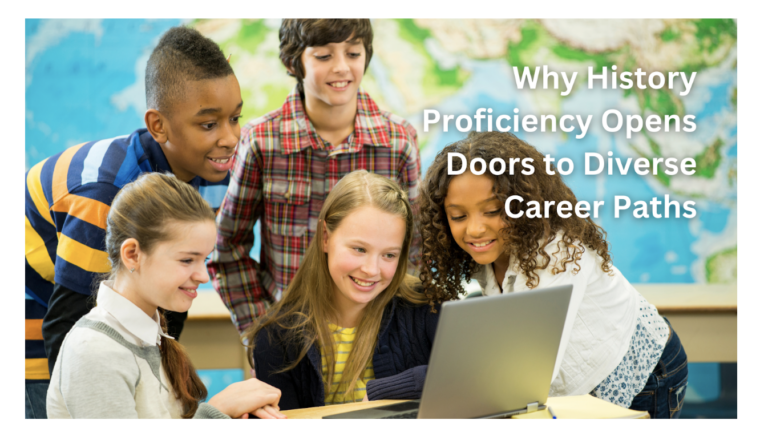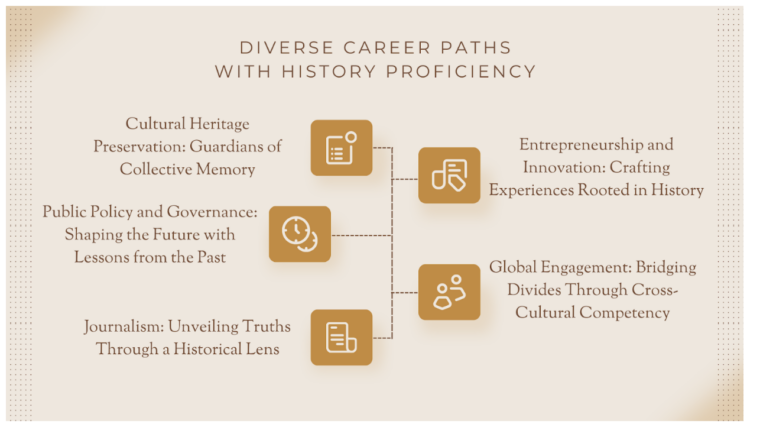Why History Proficiency Opens Doors to Diverse Career Paths?

Introduction
In the quiet corners of a softly lit library, surrounded by the scent of aged parchment and the soft sound of turning pages, a figure sits, engrossed in a stack of history books. Shadows dance around the room as they leaf through tales of empires risen and fallen, of revolutions waged and peace brokered. This figure isn’t just a scholar lost in the annals of time but a seeker of stories, a purveyor of the past, and perhaps an architect of the future.
Imagine for a moment that you are that figure, delving into the rich tapestry of human history. Immersing yourself in the chronicles of bygone eras does more than broaden your knowledge; it unlocks a treasure trove of opportunities that extend well beyond academia’s confines. History proficiency isn’t just about memorizing dates and events; it’s about understanding the intricacies of human behavior, the complexities of society, and the lessons learned from our collective past. In today’s rapidly evolving world, this proficiency serves as a key to unlocking diverse career paths as varied as the epochs they study.
Online History Tutoring: Guiding Minds Across Digital Landscapes
As the digital age continues to reshape the landscape of education, the role of history tutors has evolved significantly. No longer confined to dusty classrooms or stuffy libraries, history tutors now wield the power of technology to reach students far and wide. Online U.S. history tutors have emerged as pioneers in this digital transformation, leveraging virtual platforms to deliver engaging and interactive lessons to students across the globe. Through live video sessions, multimedia presentations, and interactive quizzes, these tutors bring the rich tapestry of American history to life, making it accessible to learners of all backgrounds and abilities.
Whether it’s as an online history tutor for high school students struggling to grasp the intricacies of world events or as a mentor guiding middle schoolers through the tumultuous waters of ancient civilizations, the impact of history tutoring transcends traditional boundaries. With the click of a button, students can connect with knowledgeable tutors who are passionate about their subject and dedicated to helping students succeed.
Online history tutoring offers a flexible alternative for students with busy schedules or extracurricular commitments, enabling them to pursue academic goals without sacrificing other life aspects. In this way, online history tutors are not just educators but facilitators of learning. They empower students to unlock their full potential and embark on a journey of discovery that transcends the boundaries of time and space.
History Proficiency: A Key to Critical Thinking
What sets history tutoring apart is not only the transmission of facts and figures but also the cultivation of critical thinking skills, the fostering of analytical minds, and the nurturing of curiosity. A skilled history tutor doesn’t just impart knowledge; they instill a passion for understanding the past and its relevance to the present.
By encouraging students to question, analyze, and interpret historical events, tutors empower them to develop a nuanced understanding of the complexities of human societies. This approach not only equips students with the tools to excel academically but also prepares them to navigate the multifaceted challenges of the modern world with confidence and insight.
Moreover, history learning goes beyond the confines of the classroom, extending into the realm of personal development and self-discovery. Studying history exposes students to diverse cultures, perspectives, and ideologies, encouraging them to reflect on their identities and beliefs within the broader human experience.

Journalism: Unveiling Truths Through a Historical Lens
Beyond the realm of education, history proficiency opens doors to a myriad of career paths that may not seem immediately obvious. Take, for example, the field of journalism. A deep understanding of history provides journalists with invaluable context, enabling them to dissect current events with clarity and insight. Whether reporting on geopolitical tensions or economic fluctuations, a historical lens provides a perspective that transcends the fleeting nature of news cycles.
Public Policy and Governance: Shaping the Future with Lessons from the Past
Similarly, the world of public policy and governance is enriched by individuals well-versed in history. From crafting legislation to shaping diplomatic strategies, policymakers draw upon historical precedents to inform their decisions and anticipate potential outcomes. In a world fraught with old and new challenges, history serves as both a guidebook and a cautionary tale, reminding us of the pitfalls of repeating past mistakes.
Cultural Heritage Preservation: Guardians of Collective Memory
But perhaps nowhere is the intersection of history and career more apparent than in the field of cultural heritage preservation. Historians, archivists, and museum curators work tirelessly to safeguard our collective memory, preserving artifacts and documents that bear witness to the triumphs and tragedies of human civilization. Their work not only honors the past but also shapes our understanding of identity, heritage, and the values we hold dear as a society.
Entrepreneurship and Innovation: Crafting Experiences Rooted in History
The allure of history proficiency extends even into the realm of entrepreneurship and innovation. Consider the burgeoning field of heritage tourism, where entrepreneurs leverage historical sites and landmarks to create immersive experiences for travelers seeking to connect with the past. From guided tours of ancient ruins to interactive exhibits showcasing pivotal historical moments, the possibilities are as endless as the stories waiting to be told.
Global Engagement: Bridging Divides Through Cross-Cultural Competency
Moreover, in an increasingly globalized world, the demand for individuals with cross-cultural competency and a nuanced understanding of international relations has never been greater. Whether working in diplomacy, international business, or humanitarian aid, history proficiency equips individuals with the tools to navigate cultural differences, bridge divides, and forge meaningful connections across borders.
Conclusion
In essence, history proficiency is not just a subject to be studied; it is a passport to a world of opportunities. Whether you are a student embarking on your academic journey or a seasoned professional seeking to pivot into a new career path, the lessons of history are timeless and universal. They remind people of shared humanity, capacity for resilience, and collective responsibility to shape the course of history for generations to come.
As you stand at the crossroads of past and present, remember that your journey is far from over. With history as your guide, you possess the keys to unlock a world of endless possibilities. Whether you choose to educate, inform, preserve, innovate, or bridge divides, your proficiency in history empowers you to leave an indelible mark on the tapestry of human experience. So, go forth with courage and curiosity, for the pages of history await your next chapter.
FAQs
How does history proficiency prepare individuals for diverse career paths?
History proficiency goes beyond memorizing dates and events; it fosters critical thinking, analytical skills, and a deep understanding of human behavior. These skills are highly transferable and applicable to a wide range of careers, including journalism, public policy, cultural heritage preservation, and entrepreneurship.
What specific career paths benefit from a background in history?
Careers in journalism benefit from the historical context provided by a background in history, allowing reporters to analyze current events with depth and insight. Similarly, policymakers draw upon historical precedents to inform decision-making, while professionals in cultural heritage preservation work to safeguard our collective memory.
How does history proficiency contribute to global engagement and cross-cultural competency?
A strong foundation in history equips individuals with a nuanced understanding of international relations and cultural differences. This is invaluable in fields such as diplomacy, international business, and humanitarian aid, where historical context can shape strategies for effective engagement and collaboration across diverse communities.
